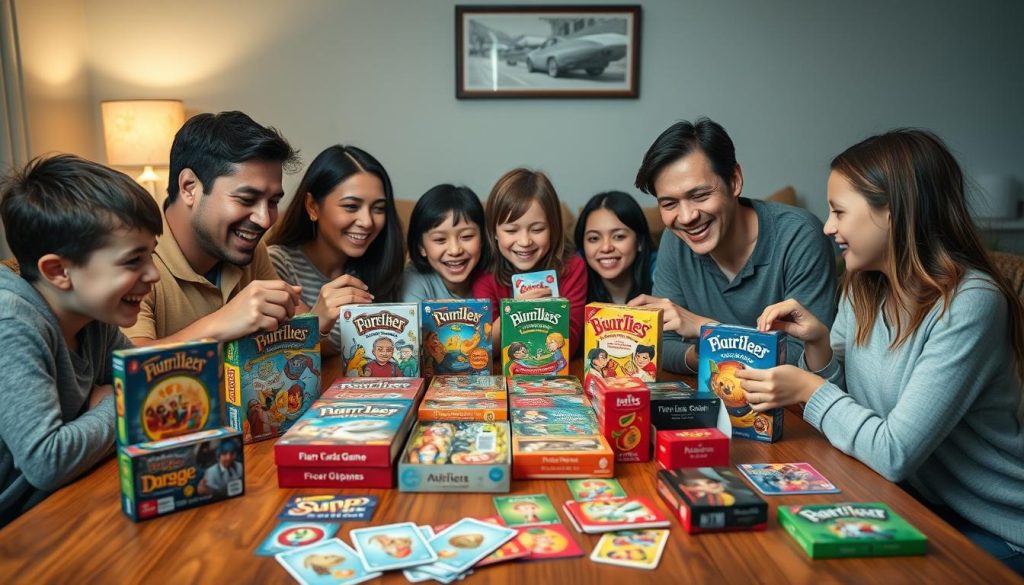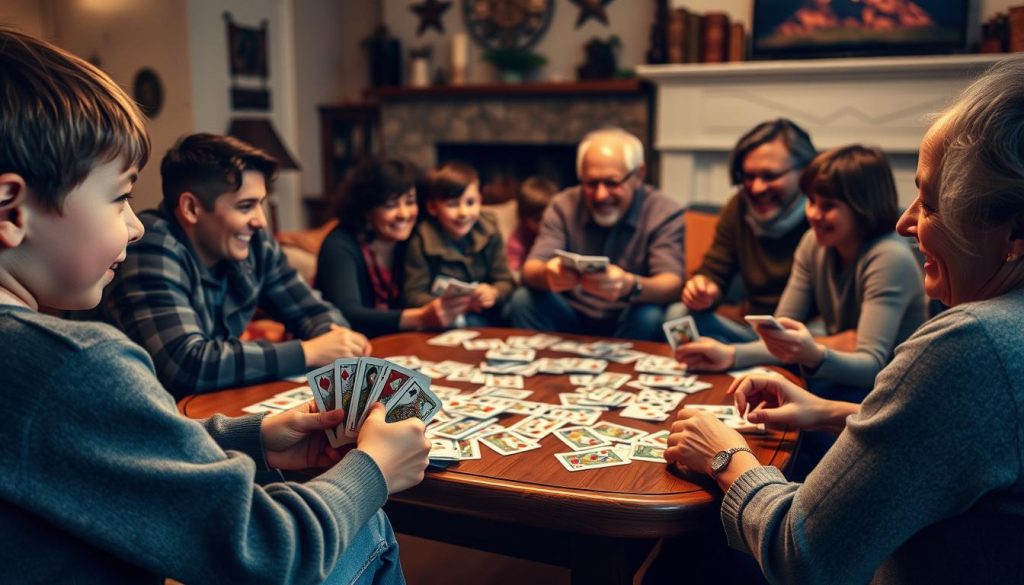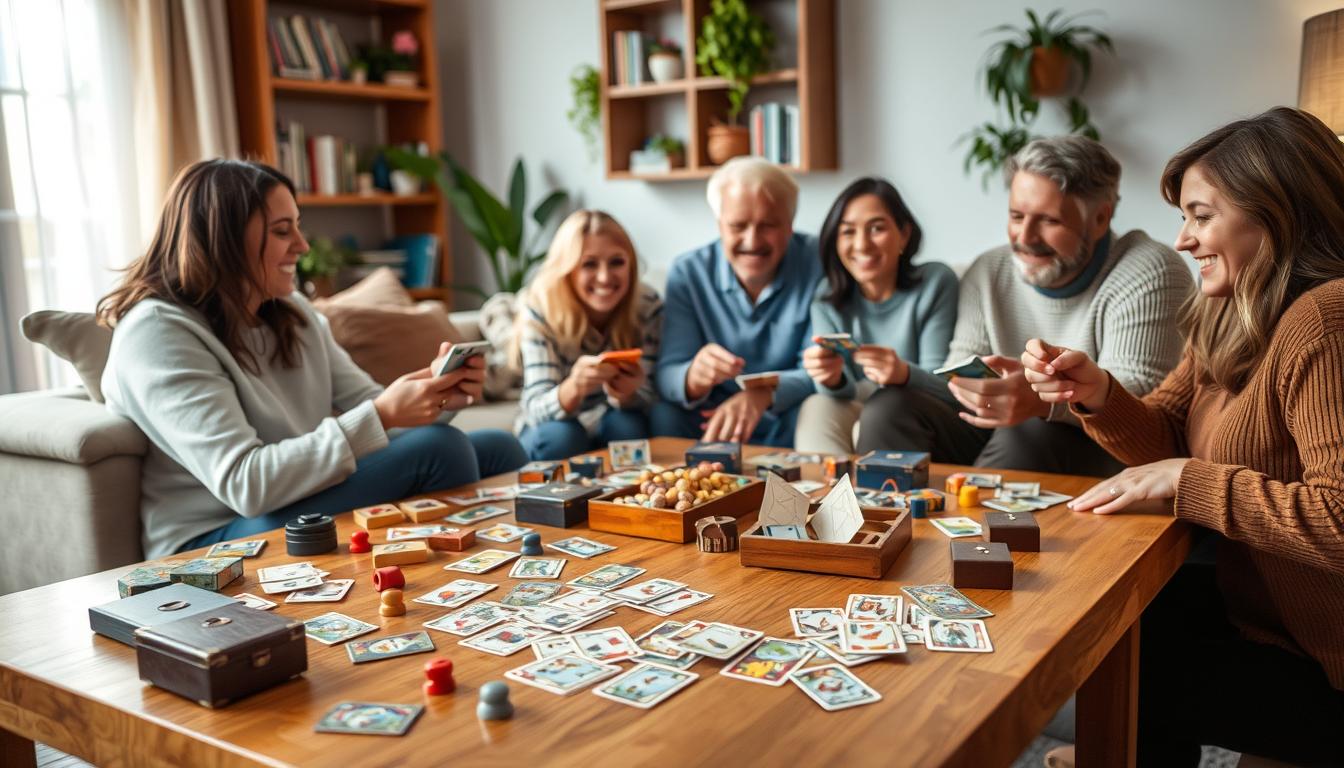Nothing brings loved ones together like playing games at a table. It’s a great way to laugh and compete. But, finding fun activities for all ages can be hard.
Family card games are special. They make memories and teach important skills like strategy and patience. They turn any night into a special time.
There are classic games and new ones for everyone. They start conversations and keep you entertained for hours. You don’t need fancy stuff to play.
Want to find your new favorite games? Let’s dive into the world of family card games. They’ll make your family closer and create memories that last.
Why Family Card Games Create Unbreakable Bonds
When families gather around a table with cards, magic happens. This is something technology can’t do. These moments create deep emotional connections that make relationships stronger across all ages.
Card games make us talk face-to-face. Players must look at each other and read expressions. This builds trust and understanding in ways screens can’t.
Playing together teaches important life lessons. Children learn patience and good sportsmanship. These skills help in real life and in relationships.
Family card games make everyone equal. Grandparents and grandchildren can compete together. This equality helps build respect and real connections.
| Bonding Benefit | How Card Games Help | Long-term Impact |
|---|---|---|
| Communication | Face-to-face interaction required | Better family relationships |
| Patience | Waiting turns and thinking moves | Improved self-control |
| Respect | Equal playing field for all ages | Stronger generational bonds |
| Memory Creation | Shared laughter and competition | Treasured family traditions |
These moments of joy and friendly competition create lasting memories. Families cherish these experiences for years. They often pass these traditions to future generations.
Essential Qualities of the Best Family Card Games
Choosing the right family card games is key. The best ones make everyone feel included and challenged. They ensure hours of fun for your family.
Easy to Learn, Hard to Master
The best games have simple rules. Players can learn them in minutes. But, they also have deep strategies for more experienced players.
UNO is a great example. Kids learn colors and numbers fast. Adults, on the other hand, develop clever strategies.
Suitable for Mixed Age Groups
Great games work for all ages. They keep everyone engaged, from kids to grandparents. No one feels left out.

Good games mix luck and strategy. This lets kids win too, while adults enjoy the challenge.
Quick Setup and Reasonable Play Time
Busy families need games that start fast. The best games set up quickly and play within 15 to 45 minutes. This fits most family schedules.
| Game Quality | Ideal Characteristic | Family Benefit | Example Games |
|---|---|---|---|
| Learning Curve | 5 minutes to learn basics | Quick inclusion of new players | Go Fish, Old Maid |
| Age Range | 3+ generation appeal | Everyone participates equally | UNO, Crazy Eights |
| Game Duration | 15-45 minutes per round | Fits family schedules | Skip-Bo, Phase 10 |
| Setup Time | Under 2 minutes | Spontaneous play sessions | Most traditional card games |
Popular Family Card Games That Never Go Out of Style
Some family card games are always a hit. They’ve been loved for years because they’re easy to learn and fun to play. They’re great for getting everyone together and having a good time.
UNO – The Ultimate Family Favorite
UNO is a top pick for family fun. It has colorful cards and exciting actions. Kids aged 7 and up can play for 30 minutes, laughing and competing.
UNO is all about luck and strategy. Wild and Draw Four cards make the game unpredictable. They keep everyone playing until the last card is gone.
Go Fish – Perfect First Card Game
Go Fish is great for young kids, starting at age 4. It’s a simple game that teaches important skills. Rounds last 10-15 minutes, perfect for little attention spans.
Playing Go Fish helps kids remember things and recognize patterns. It’s also a fun way to practice talking and listening.
Old Maid – Timeless Entertainment
Old Maid is full of suspense and laughter. It’s for kids aged 5 and up, lasting 15-20 minutes. Everyone waits to see who gets the Old Maid card.
Crazy Eights – Strategic Yet Simple
Crazy Eights is easy to learn but challenging to master. It’s for kids aged 6 and up. Games last 20-25 minutes, offering fun without being too long.
Classic Traditional Card Games Worth Rediscovering
Many families today forget the charm of classic card games. These games have entertained generations with their strategy and fun. Rediscovering them can make family game nights more exciting and connect you to a long history of gaming.
Hearts – The Thinking Person’s Game
Hearts is a game that makes you think hard. It’s a trick-taking game where players try to avoid certain cards. It’s all about patience, memory, and strategy.
It’s great for families with teens and adults. The game’s unique rules make it exciting. It’s played with four people and takes 30-45 minutes.
Spades – Partnership and Strategy
Spades is all about teamwork. It’s a game where partners must work together and trust each other. They aim to meet their bid and stop opponents.
It teaches about cooperation and planning. Playing Spades can make family bonds stronger. The bidding adds to the excitement.
Gin Rummy – Pattern Recognition Fun
Gin Rummy is perfect for two players. It’s all about recognizing patterns and sets. Players aim to make runs and sets while stopping their opponent.
It’s great for bonding between family members. Gin Rummy has been loved for generations. It’s a game that’s both fun and teaches skills.
Modern Family-Friendly Card Games Everyone Will Love
Modern designers have made card games for all ages. These games mix new ideas with easy-to-play rules. They show that new can be simple.
Today’s card games have new themes and twists on old ideas. They keep the fun of playing cards alive. Many have quickly become favorites.
Exploding Kittens – Unpredictable Chaos
Exploding Kittens is loved for its fun art and easy rules. Players draw cards, trying to avoid the explosive cats. It’s full of laughs and surprises.
This game is fun for both kids and adults. It’s all about strategy and survival. You can play many rounds in a row.
Skip-Bo – Sequential Strategy Challenge
Skip-Bo is about building stacks from one to twelve. It needs planning and strategy. Players must manage their cards and block others.
Families enjoy the mix of strategy and luck in Skip-Bo. It helps with counting and number skills. Each round brings new challenges.
Phase 10 – Progressive Difficulty
Phase 10 has ten challenges to complete. Each one needs different card combinations. It keeps the game exciting for many plays.
This game is good for all skill levels. Young players start with simple challenges. Adults can try harder ones. It never gets boring.
Apples to Apples – Creative Thinking
Apples to Apples is all about creative comparisons. Players match cards in funny ways. The judge’s choice adds a social twist.
Families love the discussions and laughter it brings. It sparks creativity and storytelling. Every round is a chance for fun and connection.
| Game | Players | Play Time | Age Range | Key Feature |
|---|---|---|---|---|
| Exploding Kittens | 2-5 | 15 minutes | 7+ | Unpredictable humor |
| Skip-Bo | 2-6 | 30 minutes | 8+ | Sequential building |
| Phase 10 | 2-6 | 45 minutes | 10+ | Progressive challenges |
| Apples to Apples | 4-10 | 30 minutes | 12+ | Creative comparisons |
Choosing Games for Different Ages and Abilities
Choosing the right card games makes family game nights fun for all. It’s important to pick games that match each person’s age and skill level. This way, everyone can enjoy the game without feeling overwhelmed.
It’s key to avoid games that make some family members feel left out. When games are right for everyone, more people play and fewer arguments happen.

Preschoolers and Early Elementary (Ages 4-7)
Young kids do best with simple card games. These games should help them learn colors and numbers. They should be easy to understand and short, lasting no more than 15 minutes.
At this age, winning isn’t as important as having fun. Choose games where everyone can win, like matching games. This helps build confidence and makes playing together enjoyable.
School Age Children (Ages 8-12)
Kids in this age group can handle more complex games. They enjoy games that challenge their problem-solving skills. Games lasting 20-30 minutes are perfect for them.
Games that require planning and making choices are great for this age. They can understand concepts like probability and risk. This is a good time to introduce more advanced gameplay.
Teens and Multi-Generational Play
Teenagers like games that are fun and involve socializing. Finding games that appeal to all ages can be a challenge. Look for games that encourage laughter and conversation.
Games that work for all ages should be fair. Choose games where experience doesn’t always win. This way, everyone can compete fairly, from grandparents to teens.
Creating Memorable Family Game Night Experiences
Family game nights are special because they make everyone feel included. To have a great time, you need to plan carefully. Think about what each family member likes.
Setting Up the Perfect Gaming Environment
Your game area is key for a fun night. Pick a cozy spot with good lighting and enough seats. Turn off phones and TVs to focus on each other.
Here’s what you need for a great setup:
- A table that lets everyone see each other
- Chairs that are comfy and the right height
- Lighting that’s easy on the eyes
- Snacks and drinks close by
- Background music, but not too loud (optional)
Managing Competition and Keeping It Fun
Make sure everyone has fun by setting rules early. Cheer for everyone’s good moves, not just winners. Help younger players when needed.
Make it all about having fun. Let everyone go first and use special rules for different ages.
Rotating Games and Including Everyone
Change games to keep things exciting. Let each person pick a game one week. Have lots of games ready for different moods.
The Lasting Impact of Family Card Game Traditions
Playing cards together makes strong family traditions. Kids who play cards with their families often keep doing it as adults. They start the same bonding activities with their kids.
Playing cards teaches kids important skills. They learn to think strategically, be patient, and play fair. These skills help them succeed in school and work.
Game nights make families closer and help them solve problems. When times are tough, these routines offer comfort. Playing cards creates a special place for talking and bonding.
To start a family card game tradition, you don’t need much. Pick games that everyone likes and play regularly. The memories made will be loved for years.
Laughter, friendly competition, and quality time around the card table are priceless. These moments become some of the most cherished family traditions.

